Texas AgrAbility, Battleground to Breaking Ground, more assist veterans in agriculture
The Texas A&M University System has a long-standing tradition of supporting active duty and veteran military personnel. That support for military service members, particularly military veterans interested in starting an agriculture-related business, continues through Texas A&M AgriLife Extension Service programs designed to assist them in reaching their after-service goals.
“We owe a great debt to those people who have served and sacrificed for this country through their military service,” said Patrick Stover, Ph.D., vice-chancellor for Texas A&M University, dean of the College of Agriculture and Life Sciences and director of Texas A&M AgriLife Research, College Station. “Through AgriLife Extension programs like Texas AgrAbility, Battleground to Breaking Ground and the Texas Military Program, we provide assistance to both active duty and veteran military members, which we hope will serve them as well as they have served our country.”
Stephen Green, Ph.D., AgriLife Extension specialist and head of the agency’s Family and Community Health unit, said many veterans are pursuing self-employment and turning to agricultural enterprises to accomplish their after-service goals.
“For many veterans, farming and ranching has become a highly sought-after career, offering self-sustainability, therapeutic healing, meaningful and flexible self-employment, continued service and other benefits,” he said.
But some military veterans struggle with unemployment in rural farming areas and may have difficulty transitioning into civilian life, Green noted.
“AgriLife Extension is committed to providing high-quality educational programs and services to current and former military families,” he said. “These programs reach thousands of active duty service members, veterans and family caregivers of wounded service members annually.
“They improve the quality of life for military families and provide opportunities to learn skills to help them transition from the battlefield into careers in farming and ranching. It is an honor for us to be able to provide these programs and services and look forward to continuing to expand our programs for military families in the future.”
Texas AgrAbility helps injured, disabled vets remain in agriculture
The Texas AgrAbility program provides veterans and others with disabilities, chronic health conditions and functional limitations the ability to start or remain engaged in production agriculture. (Texas A&M AgriLife Extension Service photo)
Rick Peterson, Ph.D., AgriLife Extension specialist and director of the agency’s Texas AgrAbility project, said the project provides services to individuals with disabilities, chronic health conditions and functional limitations to start or stay engaged in production agriculture.
The project is funded by a grant from the U.S. Department of Agriculture’s National Institute of Food and Agriculture, with additional support from the USDA’s Risk Management Agency and the Texas Department of Assistive and Rehabilitative Services.
“A number of the people we assist through this program are military veterans, some of whom have been injured while serving their country,” Peterson said. “Texas AgrAbility staff members have expertise in fields ranging from production agriculture to occupational therapy, agricultural engineering and disability services.”
Makenzie McLaurin, AgriLife Extension program coordinator for Texas AgrAbility, said program personnel make site visits and provide recommendations for equipment adaptation, home or work modifications or any additional adaptive equipment that may be needed for a farm or ranch operation.
“One of the goals of the project is to connect military veteran farmers and ranchers with service providers who can assist them through training, as well as provide them with the information, resources and technical assistance needed for their specific agricultural operation,” she said.
Texas AgrAbility client Chris Pogue is a Navy veteran whose deployments included northern Africa and Iraq. During his service, he sustained injuries, including back and traumatic brain injuries. After military service, he and his wife Theda, also a Navy veteran, began GP Ranch — a farm and ranch combination in Sulphur Springs. They produce bison, poultry and pigs, plus grow a variety of vegetables.
“AgrAbility did an on-site assessment of Mr. Pogue’s agricultural operation,” McLaurin said. “We recommended assistive equipment and task modifications to help him be more independent and successful on his farm. Some of the equipment recommendations were a safer setup for working bison, automatic barn door openers, feeding aids and a hoist for lifting heavy equipment in his shop.”
Navy veteran Chris Pogue of GP Ranch gets ready to spread feed by hand from a 50-pound bag. A preloaded, high-capacity feeder will help him save time and physical effort. (Texas A&M AgriLife Extension Service photo by Makenzie McLaurin)
Pogue said there had been many changes in agricultural technology and delivery systems in the more than two decades that had passed since he had worked on a farm.
“AgrAbility and its partnering agencies helped me catch up and find more current technology and methods to benefit my operation,” he said. “Some changes they recommended will make a big difference to me physically. For example, right now it takes two people and a lot of time and effort to open our large barn doors. And having an automatic prefilled feeder that can distribute the exact amount of feed will save both time and physical strain.”
McLaurin said AgrAbility will be collaborating with the Texas Workforce Commission’s Vocational Rehabilitation Service to get Pogue the needed equipment.
Battleground to Breaking Ground helps vets start agricultural businesses
In 2016, Texas AgrAbility and program partners received an additional USDA-NIFA grant to develop the Battleground to Breaking Ground program focused on military veterans and active-duty military farmers and ranchers.
“The Battleground to Breaking Ground program provides support to help military veterans start or expand their production agriculture businesses,” said Erin Kimbrough, AgriLife Extension program manager, College Station. Kimbrough and her husband, a Marine Corps veteran and chapter president of the Farmer Veteran Coalition of Texas, are also beginning ranchers.
She said the program works with other public and private organizations to reach returning military veterans with ground-up agribusiness training, business planning, financing options, face-to-face expert mentoring, veteran transition assistance, agricultural production training and more.
“The program’s main goals are to enhance farmer and rancher sustainability and increase the number of military veteran-owned farms and ranches,” she said.
Kimbrough said over the past three years dozens of Battleground to Breaking Ground workshops have been held throughout the state, providing education, resources, technical assistance and experiential training to over 1,000 beginning farmers and ranchers – more than 70% of them either active duty or military veterans.
She said Battleground to Breaking Ground has now expanded into a year-long, three-phrase program consisting of workshop or online training focusing on the business aspect of farming and ranching, online training focusing on in-person mentorships, agricultural production and hands-on experiential training in their chosen area of agriculture.
“Successful graduates of the year-long program have the option of accessing leased land, equipment and established markets to start or expand their operations,” she said.
Participants in a Produce Safety Training for Military Veterans workshop held at Doug Havemann’s Mesquite Field Farm in Nixon as part of the Battleground to Breaking Ground program. (Photo courtesy Doug Havemann)
Doug Havemann, an Army veteran, has served as a mentor for other military veterans through the Battleground to Breaking Ground program for the past six years. He and his wife Melissa operate Mesquite Field Farm in Nixon – a 20-acre regenerative farm where they produce grass-fed beef, pastured poultry, turkeys and vegetables.
“There’s nobody better than a (current or former military person) to be a farmer,” he said. “They are used to long hours and hard work. You have to be tough to succeed in agriculture.”
However, Havemann said, not all military people interested in agriculture “want to do agriculture the same way.”
“We ask them what they want and what type of training they need, then bring in the appropriate people to train them,” he said. “Some of the most requested training topics include high-tunnel production, poultry production, grass-fed beef production, no-till pasture management, rotational grazing and livestock watering.”
Matthew Demmer, a Battleground to Breaking Ground project participant and Navy veteran, owns the Crown D Ranch in Floresville and has Havemann as a mentor.
“We have grass-fed beef and hope to expand into sheep,” Demmer said. “I knew I wanted to go into agriculture after military service but didn’t have any experience. The Battleground to Breaking Ground program helped me learn about the ag industry as well as find resources and showed me the importance of having a business plan.
“The program also helped me with my goals so the operation could be financially stable and environmentally sustainable. It got me going in the right direction and linked me with Doug and others who had the same high degree of interest in agriculture as I did.”
Demmer said through the program he has also participated in hands-on programs at Havemann’s farm on chicken processing, cover crops, composting and grant writing. He said in the future he hopes to provide such onsite, hands-on training at his own farm to assist other beginning veteran ranchers.
The Battleground to Breaking Ground project also offers supplemental educational opportunities such as the Produce Food Safety Training for Military Veterans and an Introduction to Beekeeping program offered at no charge to military veterans and their immediate family.
Streamlining veteran access to agricultural experience, Farm Service Agency loans
The Battleground to Breaking Ground project has continued to grow, with the USDA Farm Service Agency providing funding in 2018 to develop the Veteran Farmer Streamlined Eligibility Program for increasing military veteran access to USDA-FSA loans.
U.S. Agriculture Secretary Sonny Perdue and a veteran plant blackberry shrubs during a program to introduce the Veteran Farmer Streamlined Eligibility Program. (Texas A&M AgriLife photo by Sarah Pyatt)
“The goal is to allow military veterans going through the Battleground to Breaking Ground program to receive a waiver on the three years of industry experience required for an FSA Farm Ownership Microloan or FSA Partnership Loan,” Kimbrough said.
This year, the project has partnered with the Compatible Lands Foundation to expand the hands-on training portion of the program by developing additional training sites at Mesquite Field Farm and the Farmer’s Education and Training Center in Gatesville.
“Hands-on training opportunities will be offered each month at both locations,” Kimbrough said. “Some of the training topics will be basic livestock production, vegetable production and beekeeping. There will be hands-on training related to beef cattle, sheep and vegetable production, as well as grazing and land-use planning and how to incorporate cover crops.”
She said the Battleground to Breaking Ground project also works with the U.S. Department of Defense SkillBridge program, helping service members gain valuable civilian work experience through specific industry training, apprenticeships or internships during the last 180 days of service.
“We have successfully assisted service members to participate in their Career Skills Program serving members of the Army and Air Force,” Kimbrough said. “This has allowed qualified military members to secure an internship on a farm for their last 180 days of separation from the military.”
AgriLife Extension Military Program helps service members meet life’s challenges
“Through the Family and Community Health unit’s Texas Military Program, we focus on providing informational and educational programs to assist military families in facing some of life’s more difficult challenges,” said Rachel Brauner, family and community health program coordinator, College Station.
Representatives of various military branches sign proclamation at Fort Sam Houston in San Antonio, committing to increase suicide awareness and prevention throughout Joint Base San Antonio and other military installations. (Texas A&M AgriLife Communications photo by Paul Schattenberg)
Brauner said AgriLife personnel participate in the Military Families Learning Network – Military Caregiving, which provides educational and professional development opportunities through the Department of Defense for professionals working with caregivers in military families.
“We are also involved in the Army Substance Abuse Program that provides drug and alcohol abuse prevention education for active duty and retired military personnel and their families at Joint Base San Antonio,” Brauner said. “We are also involved in suicide awareness and prevention efforts there.”
Brauner said AgriLife Extension employees work on-site at Fort Sam Houston in San Antonio to provide information and assistance to active duty and retired military as well as civilian personnel at the base.
“To my knowledge, we are the only agency with the nation’s land-grant cooperative extension system that has personnel on-site at a military installation to help address these challenges.”

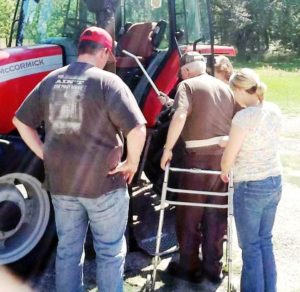
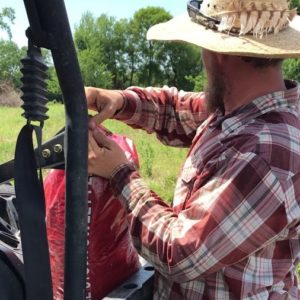
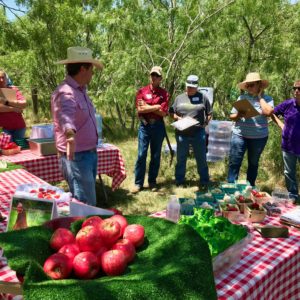
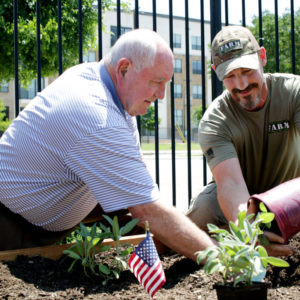
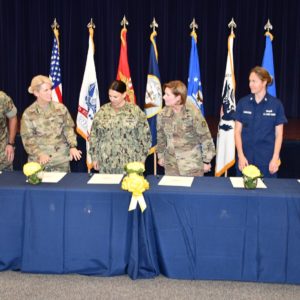
Leave a Reply